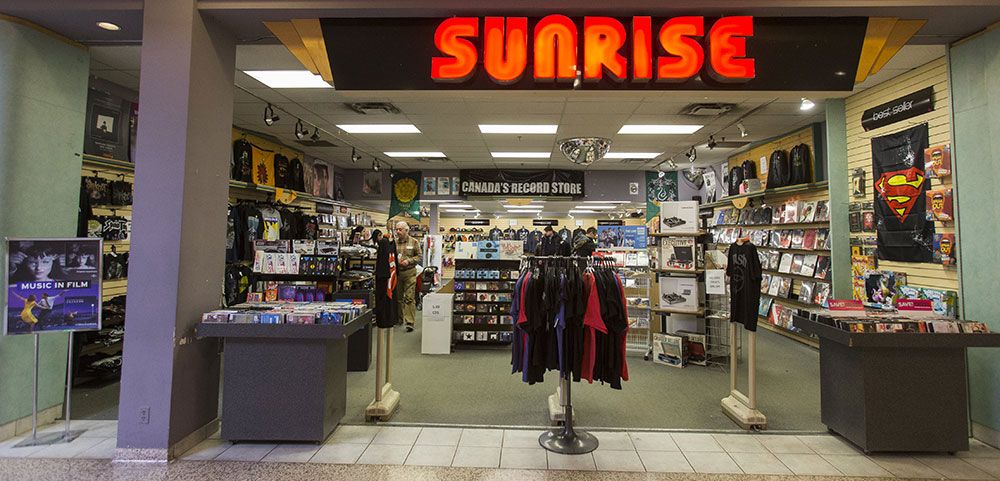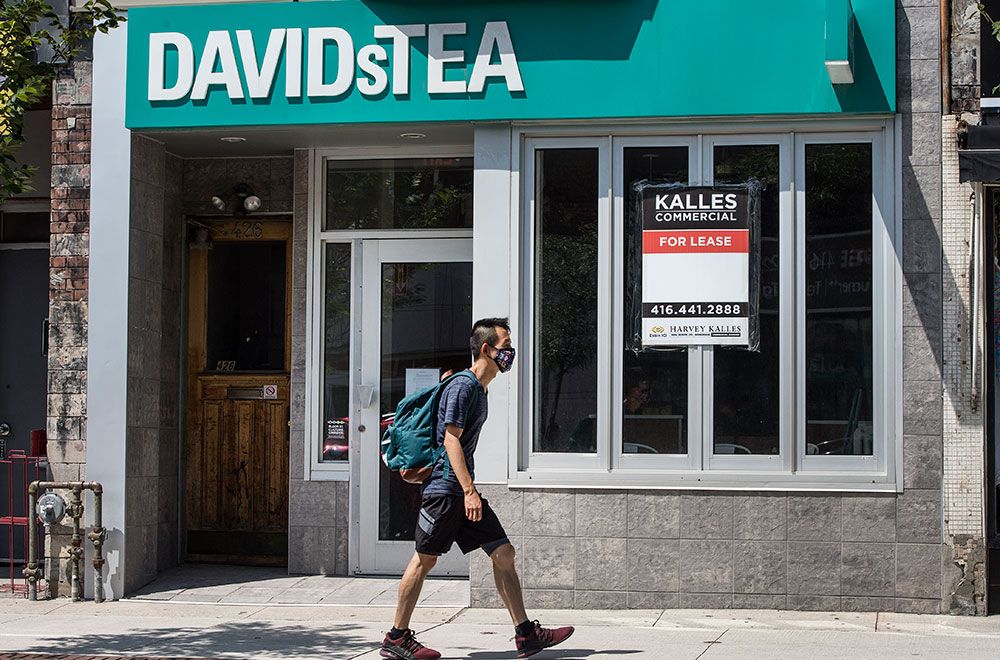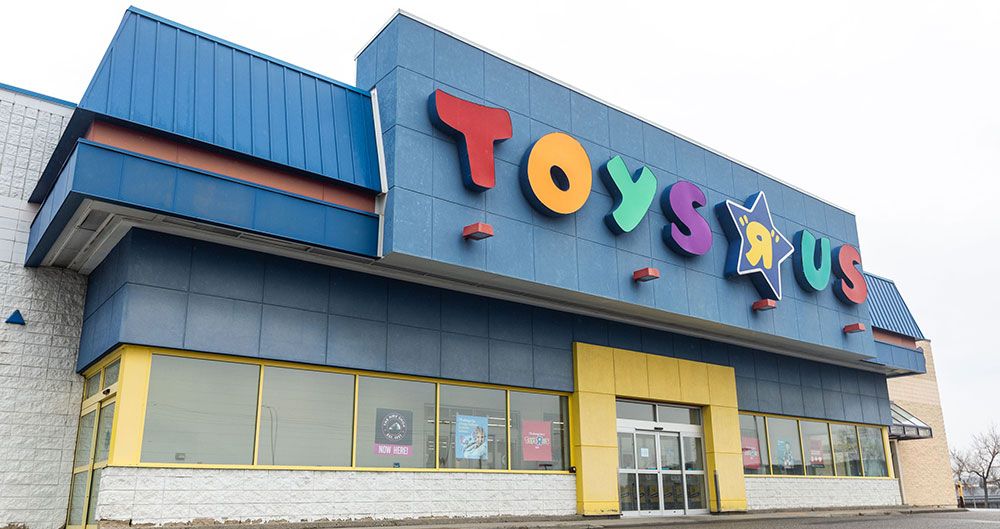Doug Putman is a self-described collector of businesses. Over the past decade, he has built a conglomerate of retailers that sell everything from vinyl records to teas and toys. Reporting from the Financial Post Western Bureau shows his Toys “R” Us empire is shrinking significantly. After closing dozens of stores — at least 38 of them this year alone — the chain is now running less than half of the locations it operated four years ago. So, who is Putman, why does he collect struggling retailers and how are his other businesses doing now? The Financial Post explains.
Why Doug Putman’s name might sound familiar
Putman first attracted national attention in 2017 when he converted dozens of shuttered HMV Canada locations into Sunrise Records stores.
HMV had launched in the country 31 years earlier, when Peter Gabriel’s “Sledgehammer” and Berlin’s “Take My Breath Away” were topping the charts. At its peak, the chain was the country’s largest music retailer. But by the time that the “Despacito” remix from Luis Fonsi, Daddy Yankee and Justin Bieber landed on the hit list, the business had collapsed as customers started moving away from buying CDs and into streaming tunes on Spotify, Google Play, Apple Music and the like.
HMV Canada had been losing $100,000 a day. And, yet, in all of the carnage, Putman saw opportunity. He bought the chain and moved his own Sunrise Records stores into 70 or so of HMV’s locations. At the time, he told The Canadian Press he was able to “mitigate” HMV’s financial challenges by “working with our landlords and our suppliers very closely.”

He would use this same strategy several times in his career, with varying degrees of success. He’s an entrepreneur “who sees opportunities to invest where others divest or, worse, go bankrupt,” said Canadian marketing specialist Tony Chapman on his podcast, Chatter That Matters, when introducing Putman as a guest in 2021.
“He will tell you that he was a failure in university,” Chapman continued, but “he’s succeeding where others have failed.”
Putman did not respond to requests for comment. The Financial Post has pieced his story together from previous reporting and Putman’s own comments in a number of podcasts in recent years.
What is Putman’s back story?
The story Putman often tells is that his dad was a steel worker and his mom a bank teller in southern Ontario. Later in their careers, they remortgaged their house for $50,000 to start a business, Putman
, hosted by Phil Albritton, in 2021.
In the beginning, the Putmans were selling sports cards, but they later expanded into boardgames and toys. They would call their business Everest Toys, which became one of the largest toy distributors in North America. Doug started working there in the early 2000s after he dropped out of university — he had been taking a business degree but didn’t like it — and his parents warned him the job wasn’t a big opportunity.
“I still remember my mom telling me, ‘There’s not much of a career here. You’ll make minimum wage, but we wish you the best of luck and come on in,'” Putman told Albritton.
Putman said he started in the warehouse, but in his spare time he made sales calls and realized he was good at it. One of Everest’s customers was Sunrise Records, then a small music retailer that was also looking to sell its business.
“I just thought this would be something really interesting to do,” he told Albritton. “I like the business. I like
the guy who was running it; he was a good friend, and so we bought the five stores. And, really, within two years of that one, I realized how tough retail is. I got a rude awakening.”
Given all of the challenges he discovered, Putman made a bet that Sunrise would be more successful if it was bigger. After the failure of HMV Canada in 2017, he expanded. When he bought HMV’s U.K. division two years later,
the Sunrise venture was profitable.
At some point during this stage of his career, Putman appears to have realized that he liked fixing up struggling businesses.
Why buy a failing retailer?
“I used to say to my wife, when you buy a business that no one wants, there’s zero pressure, because if it doesn’t work, everyone is like, ‘Well, he was an idiot to buy it anyway,'” Putman
said on the Behind Greatness podcast
, hosted by Luciano Volpe, in 2022.
By this time, Putman had been on a retail shopping spree. He bought the U.S. entertainment chain FYE, the toy company Alex Brands and Toys “R” Us Canada.
He had also taken over dozens of retail locations left vacant by DavidsTea, one of many companies that struggled during the pandemic. Using his Sunrise Records playbook, he took advantage of attractive leasing prices and converted the stores into a new brand called T. Kettle.
“My wife asks me all the time, ‘Why do you need another business?'” he told Volpe. “I just do. It’s an innate thing that once I’ve got a business, let’s say, fixed, or it’s in a good spot, it’s got the right team, I just can’t sit there and do nothing. I need to go on to the next thing. I want to fix another business.”

After
Bed Bath & Beyond Canada Ltd. went under in 2023, Putman created a new housewares brand called rooms + spaces and opened 24 stores left vacant by the defunct retailer. In 2025, his Putman Investments Inc. added even more assets to the collection, acquiring Canadian clothing brands Northern Reflections, Ricki’s and Cleo.
“In
my heart of hearts, I’m a collector,” he told Volpe in 2022. “I liked collecting sports cards when I was a kid. I like collecting art and watches now, and I like to collect businesses.”
How are Putman’s businesses doing now?
Putman’s conglomerate of retail companies is privately held, so there’s no way to independently verify its financial health. But there are some publicly available clues, which suggest some ventures have done better than others.
On the positive side of the ledger, Sunrise Records lists
, though two of them are temporarily closed. It’s a bigger footprint than the 70 or so stores that Putman said he had plans for when Sunrise moved into HMV locations in 2017.
His other music business — HMV in the U.K. — was profitable in its most recent fiscal year, according to its
filings with the British government
. The company’s take-home earnings hit $7.4 million, up slightly from a year earlier.
Some of his other companies, however, have struggled. T. Kettle, the tea retailer, began in 2020 with 45 locations, but its website now lists a single store in Burlington, Ont.
About a year ago, Putman said his most costly mistake was his foray into housewares. In a video hosted by HelpBnk, a U.K.-based social networking site for entrepreneurs,
Putman answered a series of crowd-sourced questions
about his career. One of them asked him about his most expensive setback.
He said it was his rooms + spaces venture, the chain that had quietly closed stores and shut down its website within two years of launching.
“Very quickly, it was very clear it was not going to work,” Putman said. “That was an eight-figure loss for me.”
The next question he answered was how he handles business setbacks or failures.
“I used to hear people say, ‘Oh, you know, failure is good,’ and this and that. I always just thought it was crap,” Putman said. “But I will say the learning that you get from it is fantastic. It really levels you, and I think it actually helps keep your ego in check and brings you back down to to Earth…
“You try not to make that mistake again, and you just have to move forward. There’s no sense in focusing too much on it, because it’s just going to hurt your future.”

Putman now appears to be going through another setback with his national toy chain, Toys “R” Us Canada, which had as many as 103 locations by 2023. But the Financial Post Western Bureau has found at least 38 stores closed so far this year, with another 12 locations up for sale.
The entrepreneur has not responded to requests for comment, nor has he explained why the chain’s footprint is shrinking so dramatically.
• Email: [email protected]
The Last Toy Stores
Read our series about the changing landscape of toy retail
This story is the third instalment of
, a five-part series exploring toy retail in Canada as Toys “R” Us, the country’s largest chain, shrinks its footprint. The series was produced by the
, a partnership with the Edmonton Journal, Calgary Herald, Saskatoon StarPhoenix and Vancouver Sun.
- What happened to Toys ‘R’ Us? In just four years, Canadian chain shutters over half its stores. Read it here
- ‘Category killer’: How Toys “R” Us disrupted the children’s retail industry, only to find itself disrupted by a range of market forces. Read it here








